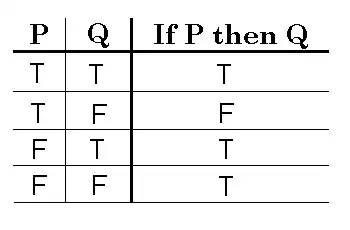Edit: I recently came across a neat illustration for how conditional statements behave. It was presented by Mark Zegarelli in Logic for Dummies:
(...) a slippery slide: Just step onto the if at the top of the slide and you end up sliding down into the then at the bottom.
A Truth Teller or a Liar
Dr. Joshua K. Lambert gives a good example:
We often refer to P in the compound statement "If P, then Q" as the hypothesis, while Q is commonly called the conclusion.
Upon first glance, the truth values associated with the implication seem to be a bit absurd when looking at the situations where P is false. We shall explain this using the following two statements.
P: You mow the lawn.
Q: You are paid $100.
We shall look at the implication of these two statements from a slightly different perspective. Instead of determining truth values let us look at this in the context of being a truth teller or a liar. Suppose a neighbor stated "If you mow the lawn, then you are paid $100." Notice that the previous sentence is just "P implies Q", and we will look at the different cases of truth values to see whether the neighbor was lying to you or telling the truth.
Case 1: We shall assume that P and Q are both true. This means that you did mow the lawn, and you were paid $100. Notice the neighbor told you the truth, which means the truth value for "P implies Q" would be true in this case.
Case 2: We shall assume that P is true and Q is false. This means that you did mow the lawn, but you never received $100. Notice the neighbor told you a lie in this case, which means the truth value for "P implies Q" would be false.
Case 3: We shall assume that P is false and Q is true. This means that you did not mow the lawn, and you were [paid] $100. Notice the neighbor never gave you any indication of what would happen if you did not mow the lawn. As a result, the neighbor was still telling the truth, which means the truth value for "P implies Q" would be true.
Case 4: We shall assume that P is false and Q is false. This means that you did not mow the lawn, and you never received $100. Notice the neighbor never gave you any indication of what would happen if you did not mow the lawn. As a result, the neighbor was still telling the truth, which means the truth value for "P implies Q" would be true.
Is p independent of q? Is p a necessary condition for q?
What is being evaluated is the value of the implication, if it holds as it is structured (if...then..., or P implies Q), as it was presented. In the given example, the neighbor lies only in Case 2, where p is true and q is false. In this case, the statement doesn't hold. We would have a basis to call him a liar or to say that his statement proved to be false concretely.
Cases 3 and 4 show us an important detail: "the neighbor never gave you any indication of what would happen if you did not mow the lawn." This is important because the statement is structured in the hypothesis of you mowing the lawn.
The statement ("If you mow the lawn, you are paid \$100") is still true, even if the neighbor next door is handing out $100 bills or if you just decide that it's ok to stay at home and chill. The statement still holds itself under its hypothesis.
So p is not independent of q, because the structure ties them together, the hypothesis being false is not part of how the statement is composed. Even if we find another neighbor that states "If you do not mow the lawn, you are paid $100" (~p -> q), the case where p -> q would still be true as it was stated.
And p is not a necessary condition for q. If p is true, then it surpassed the category of a hypothesis, and the conclusion must follow from it, otherwise, our neighbor would be lying, his statement wouldn't have held itself, because q is necessary for the "sake" of what he says. And if it was false (if you don't mow the lawn), the statement would still be valid, because the hypothesis is still open, the statement holds itself, because we simply did nothing about the lawn.
